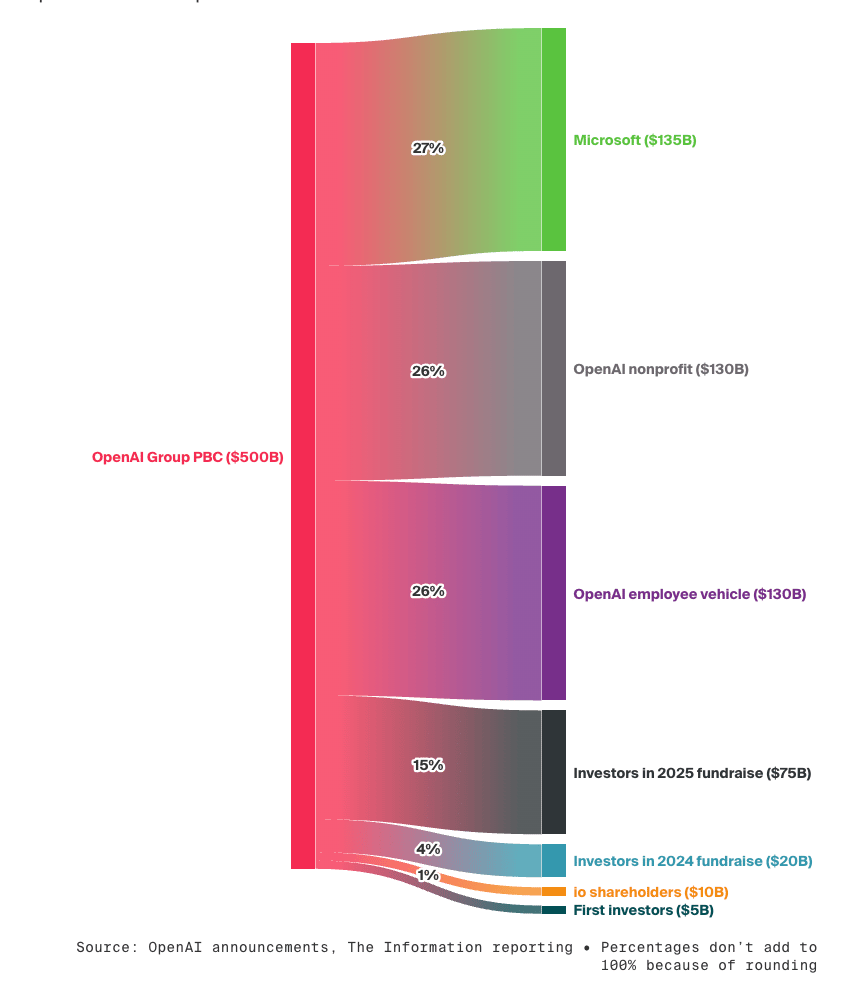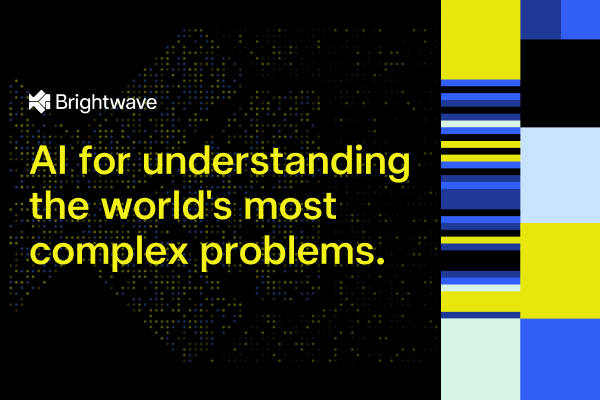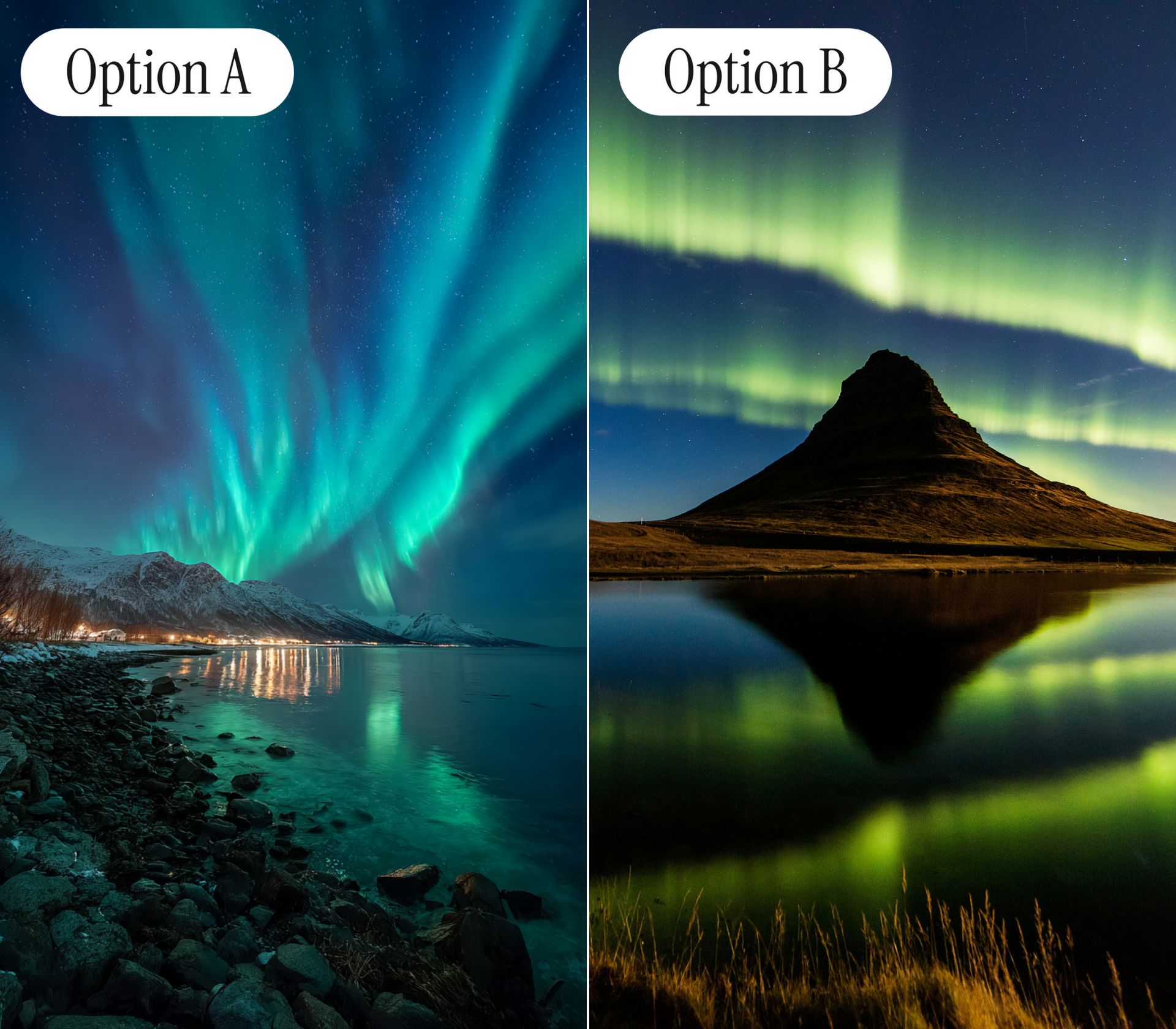- The Deep View
- Posts
- OpenAI's $500B restructuring sets stage for blockbuster IPO
OpenAI's $500B restructuring sets stage for blockbuster IPO

Welcome back. OpenAI seems determined to dominate the headlines today. Cameo, the celebrity video platform, just sued them for trademark infringement over Sora's "Cameo" feature. Cameo argues OpenAI chose the name "in blatant disregard for the obvious confusion it would create, while OpenAI counters they "disagree that anyone can claim exclusive ownership over the word 'cameo.'"
1. OpenAI's $500B restructuring sets stage for blockbuster IPO
2. General Intuition founder on the next frontier
3. Home robots arrive with remote operators watching through their eyes
BIG TECH
OpenAI's $500B restructuring sets stage for blockbuster IPO

OpenAI just solved its capital problem by creating a governance paradox: a nonprofit foundation now holds a $130 billion stake in the for-profit company it oversees, giving it every financial incentive to maximize the value of the AI it's meant to regulate.
The ChatGPT maker completed its recapitalization on Tuesday, converting its hybrid structure into a public benefit corporation valued at $500 billion. CEO Sam Altman told employees an IPO is likely and said in a public livestream it's probable "given the capital needs we will have." Those needs include $115 billion in projected spending through 2029 and $1.4 trillion in data center commitments.
The new ownership breakdown:
Microsoft holds 27% valued at $135 billion with IP rights through 2032, including post-AGI models
OpenAI Foundation controls the board and holds 26% worth $130 billion, plus warrants if the valuation hits $5 trillion
Current and former employees collectively hold 26%
Recent investors, including SoftBank, hold 15% worth $75 billion
2024 investors, including Thrive Capital, hold 4% worth $20 billion
CEO Sam Altman holds 0%
The deal lifts prior caps on investor returns and frees both companies to work with competitors. OpenAI can now strike cloud deals without Microsoft's approval, though it committed to $250 billion in Azure purchases.
California and Delaware attorneys general approved the structure after OpenAI reversed course in May on plans to fully remove nonprofit oversight.

The foundation's $130 billion stake, plus warrants for hundreds of billions more if OpenAI hits $5 trillion, fundamentally changes its relationship to safety oversight. It's now funding AI resilience research with returns from the technology, creating risks in the process. Meanwhile, investors who backed OpenAI's mission-driven narrative are sitting on conventional equity in what could be tech's largest IPO. Altman originally declined equity to maintain the nonprofit board's independence and says he's already wealthy enough from other investments to focus on what he calls his "childhood dream job" of building AGI. The restructuring doesn't resolve the tension between OpenAI's stated mission and its capital needs; it has only made it exponentially more valuable.
TOGETHER WITH BRIGHTWAVE
Is professional-grade AI the next step?
ChatGPT chokes when large datasets are on the line. Brightwave doesn't.
In fact, the platform processes 2,000+ documents with no loss of fidelity, weaving facts across hundreds of sources into coherent, evidence-backed analysis. Every finding links to primary sources at the sentence level. Edit individual sections without losing your work-no more black-box outputs that vanish when you add context. Generate comprehensive reports in minutes that would take teams days.
Brightwave's autonomous research agents surface patterns competitors miss, flag critical risks automatically, and deliver finished deliverables on-demand across preliminary research, due diligence, and ongoing monitoring. Organizations, like top-5 PE megafunds to boutique firms are seeing 25x speed improvements on research-intensive workflows.
This is AI built for professionals who need to understand the world's most complex problems. Try Brightwave today.
STARTUPS
General Intuition founder on the next frontier

Pim de Witte’s tech career began with reverse-engineering video games. He ended up reverse engineering himself into an AI startup worth millions.
De Witte is the founder of General Intuition, a research AI lab dedicated to training foundational models using gaming videos. Spun out from Medal, a platform co-founded by de Witte for sharing gaming clips, General Intuition recently announced $134 million in seed funding to help teach agents about “spatial-temporal reasoning,” or understanding how objects move through space and time.
“We were essentially sitting on the equivalent of the episodic memory of humanity and simulation,” he said.
De Witte said the usefulness of Medal’s large swathe of video game data that General Intuition is built on was “the luckiest discovery that you can make.” But de Witte told The Deep View that video games often serve as a foundation for broader discovery, pointing to Nvidia’s background in creating gaming-related chips and Twitch’s initial popularity among gamers.
“It tends to be the case that when you unlock a new consumer platform or consumer behavior, that there is some larger value to be unlocked than just sort of the platform itself,” de Witte said.
And for General Intuition, that larger value may come in several stages, he said. Initial value will likely be related to video game development, he said, but the company aims to create “general agents” trained for spatial-temporal reasoning, with use cases running the gamut from world simulation to physical devices to, down the line, humanoid robotics.
De Witte noted that the company already has pretrained models in the works and is working with a few customers. Through the funding announcement, he hopes to attract the attention of “the absolute best research talent in the world,” he said. “I think people understand that this is sort of the next frontier.”
For now, de Witte said, the company’s eye-popping seed funding is “all going to Jensen.” The majority of the company’s funding will be dedicated to cloud providers for scaling compute, he said, echoing a broader industry push towards billion-dollar AI infrastructure buildouts.
“There are no real alternatives to Nvidia chips, realistically,” he said. “Especially when you’re early on, you don’t want to have to worry about specialized architectures.”
TOGETHER WITH CALLRAIL
Never Miss A Call Again With This AI Voice Assistant
Let’s call a spade a spade: Phone calls can get exhausting. From playing phone tag and screening spam to answering endless questions, it can wear even your best reps down … which is all the more reason to get an AI voice assistant to handle them for your business.
Voice Assist by CallRail isn’t just a tool that helps you handle all your calls – it also captures and qualifies leads, handles common questions, and tracks the marketing source of every interaction. That means every call gets answered, even when you're on Do Not Disturb, so you can focus on your best opportunities.
Give Voice Assist a test right here, or skip all that and start using it for free.
HARDWARD
Home robots arrive with remote operators watching through their eyes

The $20,000 home robot is here, and for now, there's a human behind it.
1X Technologies opened preorders Tuesday for Neo, a humanoid that folds laundry and organizes shelves. The catch is that complex tasks require remote operators wearing VR headsets who control the robot while peering into your home through its cameras. CEO Bernt Børnich told the Wall Street Journal's Joanna Stern that Neo "will do most of the things in your home autonomously" when it ships in 2026, though the quality "will vary."
Stern's hands-on test revealed the gap. Fetching water from a fridge 10 feet away took over a minute. She didn't see Neo do anything autonomously. Everything was piloted remotely.
Figure AI launched Figure 03 in October for industrial and eventual home use without relying on teleoperation. Figure runs 10-hour factory shifts at BMW and is building capacity for 100,000 units over four years. It raised $1 billion at a $39 billion valuation in September from Nvidia, Jeff Bezos and OpenAI.
OpenAI's fingerprints are on both approaches. The company led 1X's $23.5 million round in 2023. 1X raised another $100 million from EQT Ventures in 2024 and is reportedly seeking $1 billion more at a $10 billion valuation. Meanwhile, The Bot Company, co-founded by ex-Cruise CEO Kyle Vogt, is raising $250 million at a valuation of over $4 billion for affordable household robots, Bloomberg reported.
The teleoperation is framed as training data collection. Børnich said 1X uses operators to teach Neo's AI through human demonstrations. Privacy controls include facial blurring, no-go zones and requiring approval before operators connect.
At $20,000 upfront or $499 monthly, early adopters are paying to be test subjects. 1X is collecting $200 refundable deposits to sell the future now and use your living room as the training ground.
LINKS

OpenAI offers free ChatGPT Go for one year to all users in India
Amazon to cut about 14,000 corporate jobs in AI push
How NDAs keep AI data center details hidden from Americans
Mem0 raises $24M to build the memory layer for AI apps
Blackstone and Saudi’s Humain ink $3B data center deal
You’ll be able to pay with PayPal in ChatGPT next year
Nvidia hosts major DC event in bid to court Trump
Apple supplier Skyworks agrees to buy rival Qorvo for $10.6B
Eli Lilly partners with Nvidia to build an AI supercomputer for drug discovery

Alai: Create presentations from scratch with AI. We had it create a presentation on why it thinks that it’s better than all the other presentation creators
Grokipedia: xAI’s new competitor to Wikipedia
GitHub Agent HQ: Manage and orchestrate various AI agents within GitHub
Adobe Max: Create AI voiceovers, custom soundtracks and AI assistants in Adobe

POLL RESULTS
Should Europe prioritize building homegrown AI competitors or focus on regulating foreign tech giants?
Build own AI champions (31%)
Regulate foreign companies harder (23%)
Do both equally (22%)
Neither—open competition is fine (12%)
Something else (write in!) (12%)
The Deep View is written by Nat Rubio-Licht, Aaron Mok, Faris Kojok and The Deep View crew. Please reply with any feedback.
Thanks for reading today’s edition of The Deep View! We’ll see you in the next one.

“Most neon bulbs can only have one color. The fake one has bulbs with multiple colors shining out.” “The writing down the street in the fake image "OEHULD&O" makes no sense (especially since the & is upside-down). And sure doesn't look Vietnamese.” “The real image is a bit blurry, lower resolution, so the imperfections tip it into the authentic category. ” |
“AI did sloppy work with the neon tubes.” “[This image] looks like it's floating. [The other image] just looks poorly lit.” “Looks more elaborate but in line with expectations ” |

Take The Deep View with you on the go! We’ve got exclusive, in-depth interviews for you on The Deep View: Conversations podcast every Tuesday morning.

If you want to get in front of an audience of 450,000+ developers, business leaders and tech enthusiasts, get in touch with us here.









